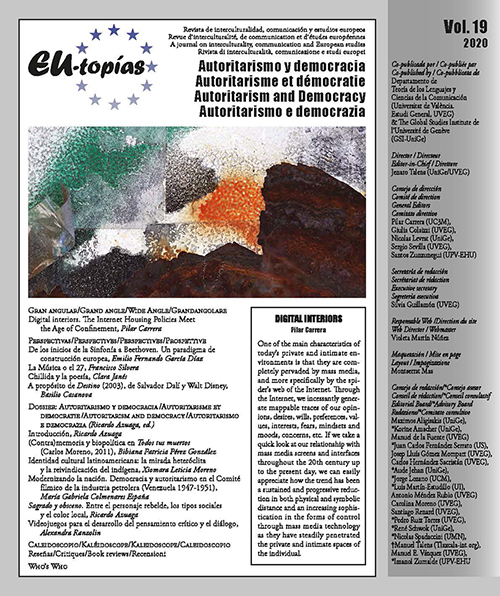Digital interiors. The Internet Housing Policies Meet the Age of Confinement
DOI:
https://doi.org/10.7203/eutopias.19.17870Keywords:
Internet, Intimacy, Mass Media, Politics, Control, Privacy, Virality, COVID-19 Abstract
Abstract
One of the main characteristics of today’s private and intimate environments is that they are completely pervaded by mass media, and more specifically by the spider’s web of the Internet. Through the Internet, we incessantly generate mappable traces of our opinions, desires, will, preferences, values, interests, fears, mindsets and moods, concerns, etc. If we take a quick look at our relationship with mass media screens and interfaces throughout the 20th century up to the present day, we can easily appreciate how the trend has been a sustained and progressive reduction in both physical and symbolic distance and an increasing sophistication in the forms of control through mass media technology as they have steadily penetrated the private and intimate spaces of the individual. This article analyzes some of the consequences of the increasing loss of symbolic and physical distance with mass media and informational technologies. The confinement caused by COVID-19 has led to an unprecedented restriction of public freedoms in countries with a long democratic tradition, combined with the generalization of legitimate and imperious digital surveillance undertaken in the name of the «public interest» especially through smartphones. It is the perfect example of an encapsulated and strictly media- controlled privacy accompanied by a massive, extensive and frenetic use of the Internet as the only window «open to the outside world» and the only means of contact as vicarious as it is frustrating with the other. The COVID-19 crisis has permitted the foreshadowing of the true dimension of the Internet in terms of control and social engineering, following decades of adaptation, interiorization and massive adoption of the medium by the citizenry. In this perfect storm in which two viral natures collided (that of the internet and that of COVID-19), the structural links between the Internet and socio-political isolation have become clear.
 Downloads
Downloads
 References
References
Bennett, Jane. Vibrant Matter. A political ecology of things. Durham: Duke University Press, 2010.
Berger, John. Panorámicas. Ensayos sobre arte y política. Barcelona: Gustavo Gili, 2018
Bourdieu, Pierre. Leçon sur la leçon. Paris: Les Éditions de Minuit, 1982
Carrera, Pilar. Basado en hechos reales. Mitologías mediáticas e imaginario digital. Madrid: Cátedra, 2020.
Deleuze, Gilles. «Post-scriptum sur les sociétés de contrôle». Pourparlers. Paris: Les Éditions du Minuit, 2003, pp. 240-247
Foucault, Michel. L’ordre du discours. Paris: Gallimard, 1999
Freud, Sigmund. Obras completas de Sigmund Freud. Tomo II. Madrid: Biblioteca Nueva, 2017.
lossowski, Pierre. Nietzsche et le cercle vicieux. Paris: Mercure de France, 1969.
Rossiter, Ned. «Organized Networks: Transdisciplinarity and New Institutional Forms». Networks. Ed L. B. Larsen. Cambridge: The MIT Press, 2014, pp. 95-99
Serra, Richard. Escritos y entrevistas 1972-2008. Pamplona: Universidad Pública de Navarra, 2011
Terranova, Tiziana. «Network Dynamics». Networks. Ed. L. B. Larsen. Cambridge: The MIT Press, 2014, pp. 88-95
Downloads
Published
How to Cite
-
Abstract407
-
PDF265
Issue
Section
License
![]()
The authors conserve the copyright. All content published in EU-topías. Journal of interculturality, Communication, and European Studies are subject to the license Creative Commons Attribution-NonCommercial-ShareAlike 4.0 license. The full text of the license can be found at <http://creativecommons.org/licenses/by-nc-sa/4.0>
They may be copied, used, disseminated, transmitted and publicly displayed, provided that:
- The authorship and original source of the publication is cited (journal, publisher and URL of the work).
- They are not used for commercial purposes.
- The existence and specifications of this license of use are mentioned.
It is the responsibility of the authors to obtain the necessary permissions for images that are subject to copyright.



